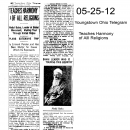Main menu
- ‘Abdu’l-Bahá’s Journey
- World Peace
- Stopping Racism in America
- Empowerment of Women
- More Principles...
- Prayer for America
Teaches Harmony of All Religions
‘Abdu’l-Bahá, Leader of Bahá’í Movement, Making Tour Through United States
PLANS EXTENSIVE TRIP
Is Eminent Persian and Has Been Martyr for Cause Which He Represents
The life of ‘Abdu’l-Bahá, leader of the Bahá’í movement, which teaches the harmony of all religions and universal brotherhood, is full of interesting events and striking incidents. This eminent Persian has recently arrived in America, one of the few countries which he has visited since the revolution of the young Turks, in 1908, set him free from a captivity which lasted about half a century.
Fame Precedes Him.
It was found during his recent visits to England, France and Switzerland that his fame had preceded him. And this is equally true of the tour he is now making of America. For although Bahá’ísm only reached America at the time of the World’s fair at Chicago in 1893, yet the movement has taken wide hold upon thoughtful people.
One advantage which it offers religionists as a cure for religious differences is that it does not require or expect people to leave their own churches or organizations. It teaches that all religions were of divine origin, and therefore it is only necessary for each religionist to live up to the potentialities of his own creed and practice the teachings of its founder. In this way they will find themselves upon a common working basis.
Victim of Persecution.
The life of ‘Abdu’l-Bahá has been nearly all passed under Moslem rule in Turkey. And, as might be supposed, he could not hold and maintain such progressive views without becoming the victim of much persecution. In fact, from his childhood, when he accompanied his father, Bahá’u’lláh, into exile from Persia to Turkey, until within a few years, Abbas Effendi has been imprisoned or persecuted in other ways.
His noble face, which is lighted up with cheerfulness and love for all humanity, also shows much suffering. But Abbas Effendi, as well as his friends, would doubtless regard these furrows as marks of honor. For the Bahá’í movement, of which he is now the leader, a position in which he succeeded his father at the latter’s death in 1892, numbers among its devotees about 20,000 martyrs. Many stories are told to illustrate the patience and gentleness of this great Oriental teacher, who calls himself ‘Abdu’l-Bahá, the servant of God.
Always Ready to Help.
In his dealings with people with a view to relieving their sufferings, differences of religious views have no bearing with him. Wherever there is misery, he has always been ready to take the part of a good Samaritan. In regulating his charities at Akka he often used to associate with himself a Moslem and a Christian. He thus impresses upon the people that the important thing is service through love. In fact he does not allow his friends in Turkey to propagate the Bahá’í faith. But they win people through good deeds and loving service.
One of the strongest points in favor of the Bahá’í teachings is its liberality to women. In the Orient, where the women of the harems are little better than slaves, this is a matter of the utmost importance.
Has Only One Wife.
‘Abdu’l-Bahá is himself the husband of one wife and his followers among the Mohammedans are guided by his advice in this matter. Among the persons whom he addressed on his recent visit to England were the suffragettes. He admired their freedom. In one of his talks he called to mind that while in London he had seen a man and a woman racing upon bicycles. He seemed much amused that the woman won the race.
‘Abdu’l-Bahá will visit a number of American cities, possibly going as far west as California. He will address peace societies, churches and other gatherings and give his message of righteousness and peace.
Precepts of Bahá’ísm.
A few of the precepts of Bahá’ísm are as follows:
“The principle of faith is to lessen words and increase deeds. He whose words exceed his acts knows verily that his non-being is better than his being and his death better than his life.
“The progress of man depends upon faithfulness, wisdom, intelligence, chastity and deeds. Verily man is not called man until imbued with the attributes of the Merciful. He is not man because of wealth and adornment, learning and refinement. Blessed is He who is free from the names, seeking the shore of the sea of purity and loving the melody of the dove of virtue.
[picture caption: BAHAI LEADER WHO IS TOURING THIS COUNTRY
‘Abdu’l-Bahá]









